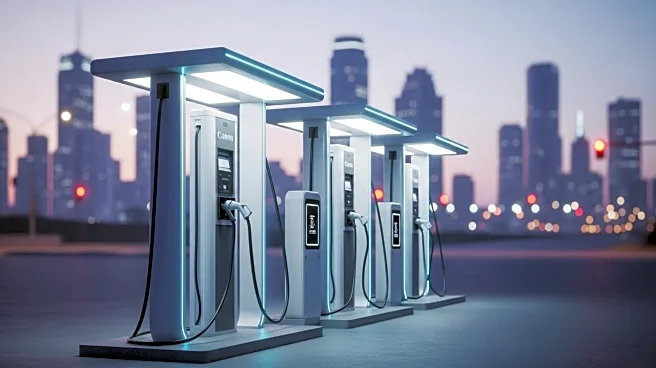What's Happening?
Electric vehicle (EV) sales have experienced significant growth since 2020, marking a notable shift in the automotive industry. According to data from the International Energy Agency, nearly 20 million EVs were sold in 2024, out of a total of just under 80 million vehicles. This growth contrasts sharply with the declining sales of fossil-fueled cars, which have not recovered to pre-pandemic levels. The trend indicates a growing consumer preference for electric cars, despite narratives suggesting otherwise. The data highlights a consistent increase in EV sales over the past five years, with substantial growth recorded each year since 2020.
Why It's Important?
The rise in electric vehicle sales is significant for several reasons. It reflects a shift in consumer preferences towards more sustainable transportation options, driven by environmental concerns and advancements in EV technology. This trend has implications for the automotive industry, which must adapt to changing demands by investing in electric vehicle production and infrastructure. The decline in fossil-fueled car sales suggests a potential peak in 'gasmobile' sales, indicating a long-term shift towards electrification. This transition could lead to reduced emissions and improved air quality, aligning with global efforts to combat climate change.
What's Next?
The continued growth of electric vehicle sales is likely to influence future industry strategies and policies. Automakers may increase their focus on developing new EV models and expanding charging infrastructure to meet rising demand. Additionally, governments might implement policies to further encourage EV adoption, such as tax incentives or stricter emissions regulations. The automotive industry will need to navigate these changes while addressing challenges related to battery production and supply chain management.
Beyond the Headlines
The shift towards electric vehicles also raises questions about the future of energy consumption and resource management. As EV adoption increases, there will be a greater demand for electricity and raw materials used in battery production, such as lithium and cobalt. This could lead to geopolitical implications and necessitate advancements in sustainable mining practices. Furthermore, the transition to electric vehicles may impact employment in traditional automotive sectors, requiring workforce retraining and adaptation.









